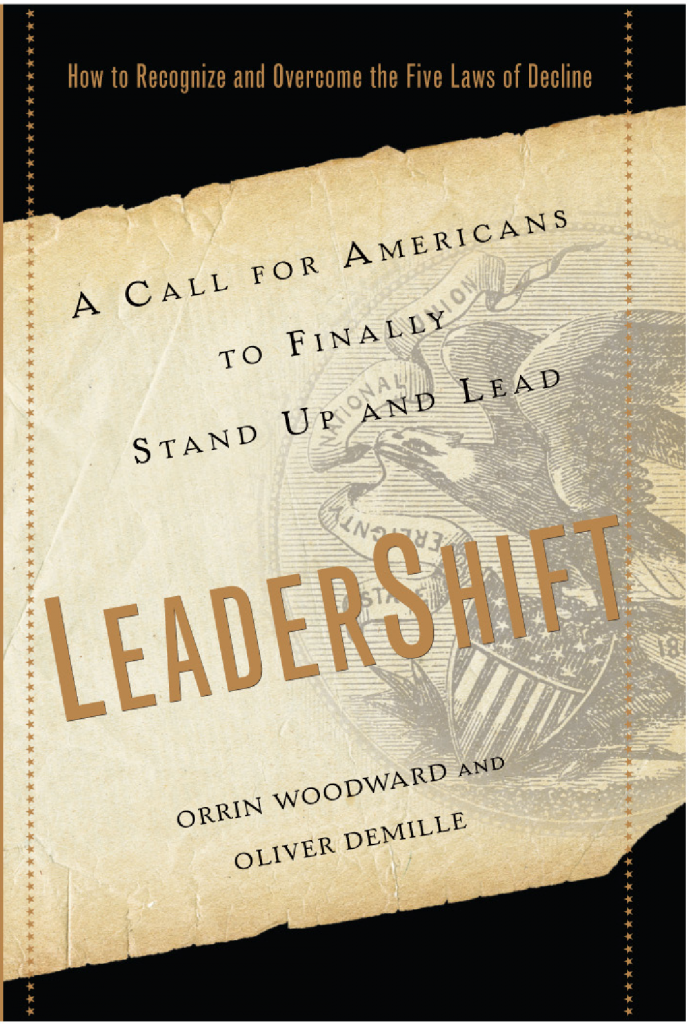Is China Really a Threat?
March 11th, 2013 // 1:01 pm @ Oliver DeMille
 I try to read most new books on China, because I think the growth of China on the world stage will continue for some time and eventually conflict with America’s interests.
I try to read most new books on China, because I think the growth of China on the world stage will continue for some time and eventually conflict with America’s interests.
Whether the conflict turns to cooperation or serious difficulty remains to be seen, but keeping abreast of what is happening in China is essential for today’s leaders.
A new book, Is China Buying the World? by Peter Nolan, is an interesting addition to the field and adds several key ideas to the dialogue.
First, it makes the case that no, China is not buying the world any more than Japan bought it in the 1980s (despite widespread fears that this was occurring).
Second, however, China is certainly growing economically and in world influence.
Chinese firms have purchased ownership in a number of companies around the advanced world, as well as tying up access to a lot of natural resources in the developing world.
And numerous multi-national companies have heavily invested in China.
This growth will likely continue, and even expand.
Third, China’s major challenge is restricted access to oil and energy.
As it grows, its thirst for energy will continue to increase and drive its international business expansion.
Fourth, China wants to be a much bigger player on the world scene, and it is following a specific strategy for global influence.
This strategy includes major investments in two key sectors of the world economy, banking and the aerospace industry.
Chinese leaders hope that together, these things—increased investment in the developing world, increased ownership of international resources especially oil, growing global investment in China, increased ownership in multi-national companies, major growth of Chinese influence in the banking and aerospace sectors—will significantly strengthen China’s world role.
Fifth, advances in the aerospace industry are significant because of the close ties between military and business technologies and projects.
As China increases its role in this endeavor, along with banking, it becomes more powerful economically, technologically and, if it chooses, militarily.
This book is a detailed and important read for anyone who cares about the future of the big powers in world relations.
More to the point, more people need to read and think more about the specific issues currently at play in China’s growth.
***********************************
 Oliver DeMille is the chairman of the Center for Social Leadership and co-creator of Thomas Jefferson Education.
Oliver DeMille is the chairman of the Center for Social Leadership and co-creator of Thomas Jefferson Education.
He is the author of A Thomas Jefferson Education: Teaching a Generation of Leaders for the 21st Century, and The Coming Aristocracy: Education & the Future of Freedom.
Oliver is dedicated to promoting freedom through leadership education. He and his wife Rachel are raising their eight children in Cedar City, Utah.
Category : Blog &Book Reviews &Business &Current Events &Economics &Featured &Foreign Affairs
China v. Japan
March 1st, 2013 // 10:18 am @ Oliver DeMille
Interesting commentary with visuals:
Category : Blog &Current Events &Economics &Foreign Affairs
Bigger Isn’t Always Better
February 13th, 2013 // 4:04 pm @ Oliver DeMille
 In the push for more gun control and changes to our national immigration policy, a few very important things have been mostly left out of the news in recent weeks.
In the push for more gun control and changes to our national immigration policy, a few very important things have been mostly left out of the news in recent weeks.
They have been mentioned, yes, but not emphasized.
And these items deserve to be seriously considered by all Americans.
- First, economic figures came out last week showing that the U.S. economy actually shrank during the last quarter of 2012—with negative growth in the U.S. GDP. The Administration waived this off as hardly newsworthy, a mere blip in many months of growth, but for those who closely watch the economy this is a serious concern. Recession hurts us all.
- Second, a poll last week showed that 53% of American citizens consider the federal government a threat in their lives.[i] This is very different from an approval rating. In fact, this is extreme. A majority of Americans now see Washington as a threat. This is a big deal, because a nation that doesn’t trust its government is going to become increasingly dysfunctional—and solutions are going to be more difficult in such an environment.
- Third, a new article argues that Congress and some federal Executive-Branch agencies are prone to political corruption[ii]—especially from well-funded special interest groups. The article concluded with concern that it is probably only wishful thinking to hope we can ever return to being governed according to clear, known, accepted principles instead of bureaucratic complexities. Government now is just too big.
- Fourth, as a corollary of item three, the complexity brought on by the sheer size of the federal apparatus has created the same level of bureaucratic technicality at the state and many local levels of government. Even our towns, cities and counties now tend to operate in the complicated style of federal agencies, where simplicity is suspect and byzantine rules apply to things that should be easy and straightforward. Locales are often funded from Washington and find that their otherwise uncomplicated systems must be complex in order to interface with federal offices and programs. The World Economic Forum ranked the United States 76th in free economic burdens on business growth.
- Fifth, many modern governments are now in the business of creating new “rights,” telling people that they need these “rights,” and then finding that the government can’t afford to fund these “rights.”[iii] This causes government to grow even more, in the desperate attempt to fund newly-established “rights” by consistently increasing taxes. Note that such “rights” aren’t inalienable, but rather established by governments. Among these “rights” are health care, unemployment income, and the pursuit of money for a growing number of consumer wants.
- Sixth, the U.S. infrastructure of roads, bridges, electric grids and drinking-water systems will cost $2 trillion to bring up to first-world standards.[iv] This at a time the government can hardly afford its current liabilities.
In short, government policies are slowing or reversing our economic growth, the people don’t trust their government, the government just keeps growing and growing, costs are increasing, and government is becoming increasingly complex and difficult to manage at all levels.
This same bundle of policies—along with massive involvement in foreign wars—brought down many of the empires of history, including the Roman, Ottoman and British.
Perhaps the six items outlined above haven’t led the news cycle simply because they aren’t really anything new.
Most regular Americans probably already knew about these trends—at least at a gut level—before they were officially announced.
Still, these are in many ways the big news of 2013.
This is the new environment in which we live, and all of these trends are making freedom less likely to flourish in the months, years and decade ahead.
Government is simply too big right now, and as it continues to increase in size many more such problems will naturally arise.
[i] See discussion on This Week with George Stephanopoulos, February 3, 2013.
[ii] Richard A. Epstein, “The Perilous Position of the Rule of Law and the Administrative State,” Harvard Journal of Law and Public Policy, Winter 2013, vol. 36, no. 1, pp. 5-19.
[iii] See, for example, ibid, pp. 10-12.
[iv] See Fareed Zakaria, “Can America Be Fixed?” Foreign Affairs, January/February 2013, p. 28.
***********************************
 Oliver DeMille is the chairman of the Center for Social Leadership and co-creator of Thomas Jefferson Education.
Oliver DeMille is the chairman of the Center for Social Leadership and co-creator of Thomas Jefferson Education.
He is the author of A Thomas Jefferson Education: Teaching a Generation of Leaders for the 21st Century, and The Coming Aristocracy: Education & the Future of Freedom.
Oliver is dedicated to promoting freedom through leadership education. He and his wife Rachel are raising their eight children in Cedar City, Utah.
Category : Blog &Current Events &Economics &Featured &Politics
The Republican Presidential Candidate of 2016
February 13th, 2013 // 3:02 pm @ Oliver DeMille
 Conservatives keep saying two things in the aftermath of losing the 2012 presidential election to Barack Obama.
Conservatives keep saying two things in the aftermath of losing the 2012 presidential election to Barack Obama.
First, they talk a lot about the 2016 election, but there is no real front runner to be the Republican candidate.
In fact, the few people who are mentioned as possible nominees aren’t drumming up much excitement.
But the second idea that keeps floating around in conservative circles is a much worse problem for the Right.
This argument goes something like this: “Well, of course we lost the election. After all, the majority of people in America want the government to take care of them. They voted for Obama because he promised more government programs, and as long as the electorate acts this way conservatism isn’t going to win much in the years ahead.”
This narrative goes along with the widely-publicized comments by Mitt Romney about 47% of the people wanting a government handout.
Whether or not this got reported accurately—and in this media environment almost nothing does—the reality is that far too many on the Right see things this way.
This is the general mood among many conservatives right now: “The people want socialism, so America’s future is dim, and only some great, overwhelming event or leader will ever get things back on track.”
On the one hand, if this sense of overwhelm gets the House of Representatives to finally take a stand and just shut down the non-essential parts of the federal government, then it is all well worth it.
Until the House gets serious about stopping the White House and Senate from continuing its reign of debt, deficits, credit downgrades, more regulations and increased spending/borrowing, the decline of America will continue.
And by shutting down the non-essential government, the House will operate from a position of power.
But there is a bigger problem with the current sense of Republican malaise.
To put it bluntly, it is downright wrong.
Republicans don’t keep losing the presidential election because a majority of Americans want government programs.
This is an issue, but it isn’t the issue.
No, the Right doesn’t win the White House as often as the Left because it persists in believing that the electorate votes in presidents based mainly on the issues.
This is inaccurate.
In the television era, the majority votes for the coolest candidate, pure and simple.
Does anyone really think that Eisenhower, Nixon or Ford could have won the White House in our current media environment?
Well, maybe Eisenhower’s status of war hero would have been enough, and for the record, Ford never actually won at the top of the ticket.
But Carter never had a chance against Ronald Reagan.
In short, the coolest candidates win in our modern American political milieu.
And Republicans aren’t prone to lifting a candidate through the primaries and putting in a nominee based on electability–which now includes charismatic television effectiveness, or put simply, coolness—rather than the issues.
Democrats believe in the emotional appeal of candidacy, and they often put up the most appealing nominee.
For many, if not most, Republicans, this feels like a cop out, a sellout of what matters most (ideas) to what is most likely to win (emotional appeal).
This isn’t because Democrats are shallow, despite what some on the Right may say.
It is just that Democrats generally think it is possible to get a candidate that is both strong on the issues and also cool.
Republicans would like to do the same, where possible, but they ultimately tend to go with candidates on the issues.
Just the issues.
If the candidate is also cool—like Reagan or Arnold Schwarzenegger—so much the better, but for most Republican primary voters the issues are the issues are the issues.
Election after election, the cool candidate wins.
Voters chose Reagan over Carter and later above Mondale, and they picked Bush over Dukakis.
Reagan was cool, and Bush benefited from just how cool Reagan was.
But if Clinton had been running in 1988, the first Bush would have lost.
Clinton was definitely cool, as both Bush and Dole found out.
Here is how the modern-era elections have turned out:
Cool Candidate Result Impact
Reagan Won 2 Terms
Clinton Won 2 Terms
Bush II Won 2 Terms
Obama Won 2 Terms
Lacking Cool Result Impact
Mondale Lost
Dukakis Lost
Bush I Won 1 Term
Dole Lost
Gore Lost
Kerry Lost
McCain Lost
Romney Lost
In 2013, it might seem like Bush II doesn’t belong on the cool list. But just remember how intensely people supported him in 2000.
He was the frontrunner from the get-go, talked about for four years after 1996 as the next president (at least in Republican circles), the larger-than-life governor of Texas, the son of George and Barbara Bush, the next member of the dynasty.
And Al Gore was, well, he belonged on the list of candidates like Mondale, Dukakis and Dole.
Say whatever you want about any of these candidates and their political strengths or weaknesses, but a majority of voters thought they were boring.
On the same note, if Howard Dean had won the nomination he most likely would have won the election over Bush II—just apply the cool test.
Gingrich was the coolest leading Republican candidate in 2012, but he wasn’t as cool as Obama.
There is no way to verify this kind of historical “what if,” but today the Right is doing something just as ridiculous.
They are in denial, frustrated with the American voters, refusing to take responsibility for the fact that they need a real candidate.
Democrats already have their heir apparent, Hillary Clinton, and whether or not she eventually runs, the party is already laying the groundwork to win in 2016—their candidate will benefit from this, whoever it is.
Republicans have no such plan.
Their best hope right now is that Joe Biden is the next Democratic candidate (Biden has a lot of strengths, but in the modern television sense he isn’t cool, not like Reagan, Clinton, Bush II and Obama were cool.)
Republicans might luck out, for example if Rand Paul turns out to have the cool factor his father does combined with the party credentials primary voters look for, or if Marco Rubio can be more like Chris Christie or Christie can be more like Marco Rubio.
But right now, the 2016 Republican candidate for president is entirely unclear—which gives the clear advantage to Clinton II.
For Democrats, not having a real frontrunner yet wouldn’t be a problem.
Both Clinton and Obama came almost out of nowhere, for example.
But Republicans want someone who is known.
Even Reagan had to run twice before he won the presidency.
So, while it is possible that some new, exciting, cool conservative will arise in the next four years, it is highly unlikely.
The cast is probably set.
Republicans just have to decide who will win the lead role.
If they choose another candidate on the issues without giving much regard to coolness, they’ll lose again.
And again—until they figure out that the voters want a cool president.
For conservatives who consider this a frustrating, high-school approach to electing a president, you are probably right.
But until the Right puts up a presidential candidate that is both strong on the issues and cool, Republicans will keep losing.
***********************************
 Oliver DeMille is the chairman of the Center for Social Leadership and co-creator of Thomas Jefferson Education.
Oliver DeMille is the chairman of the Center for Social Leadership and co-creator of Thomas Jefferson Education.
He is the author of A Thomas Jefferson Education: Teaching a Generation of Leaders for the 21st Century, and The Coming Aristocracy: Education & the Future of Freedom.
Oliver is dedicated to promoting freedom through leadership education. He and his wife Rachel are raising their eight children in Cedar City, Utah.
Category : Blog &Culture &Current Events &Featured &Government &Politics
A LeaderShift is coming. Are you ready?
February 8th, 2013 // 2:09 pm @ ekdemille
Now available for presale!
P lease join us in celebrating Oliver DeMille’s latest work, co-authored with best-selling author and business guru Orrin Woodward — the soon-to-be released book, LeaderShift: A Call for Americans to Finally Stand Up and Lead, with an on-sale date of April 16, 2013.
lease join us in celebrating Oliver DeMille’s latest work, co-authored with best-selling author and business guru Orrin Woodward — the soon-to-be released book, LeaderShift: A Call for Americans to Finally Stand Up and Lead, with an on-sale date of April 16, 2013.
This action-packed business fable is the culmination of Orrin and Oliver’s combined expertise and will offer every North American a deeper understanding of the Five Laws of Decline and how the respective effects are becoming increasingly evident in the United States.
LeaderShift will explain this devastating phenomenon in detail, motivate readers to take immediate and precise action and, most importantly, offer guidance on how each individual can contribute to not only stopping, but reversing this crippling trend.
Orrin and Oliver are proud to have LeaderShift published by the prestigious Hachette Book Group (second largest book publishing company in the world) and will hit the mainstream under the Business Plus imprint of one of the country’s most elite book publishing groups. In 2011, Hachette Book Group had a record 182 print books and 62 eBooks on the New York Times bestseller list, 45 of which reached #1.
At the time of this posting, LeaderShift is already rated #38 on Amazon’s sales ranking for Business Leadership titles, and #25 on Barnes and Noble.
Pre-order your copy today! >>
Category : Blog &Book Reviews &Business &Current Events &Entrepreneurship &event &Independents &Leadership











